26+ Sample Work Assessments
-
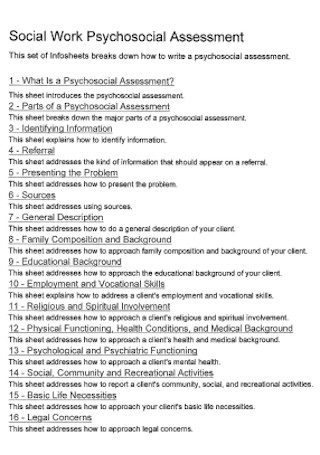
Social Work Psychosocial Assessment
download now -
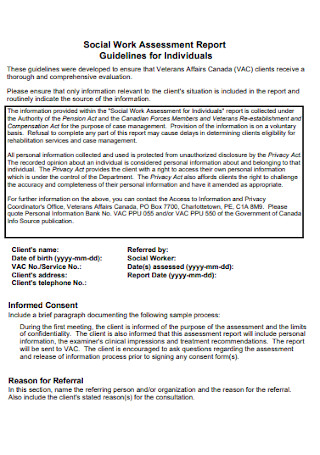
Social Work Assessment Report
download now -
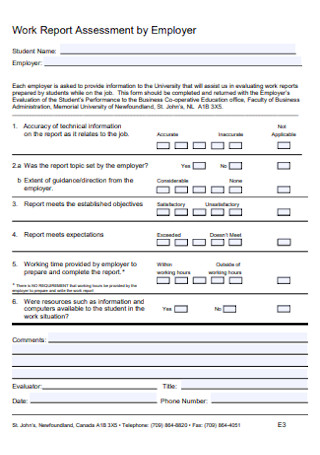
Work Report Assessment by Employer
download now -
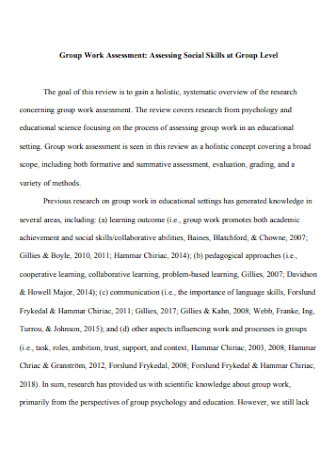
Group Work Assessment
download now -
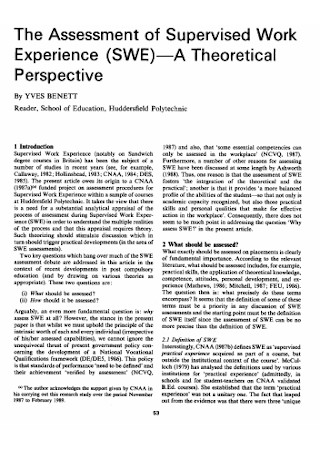
Assessment of Supervised Work
download now -
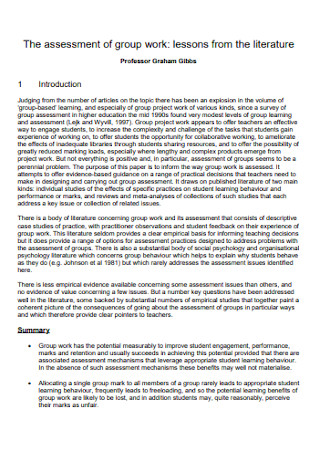
Sample Assessment of Group Work
download now -
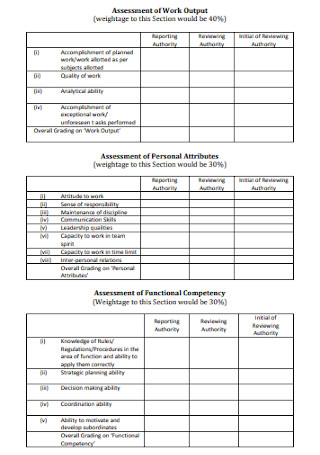
Assessment of Work Output
download now -
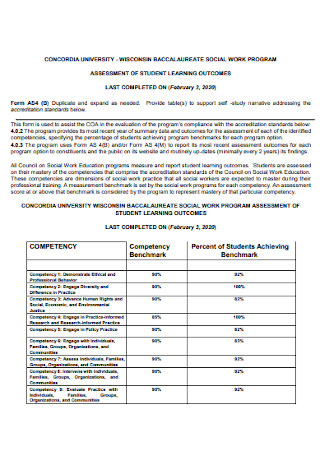
Program Work Assessment
download now -
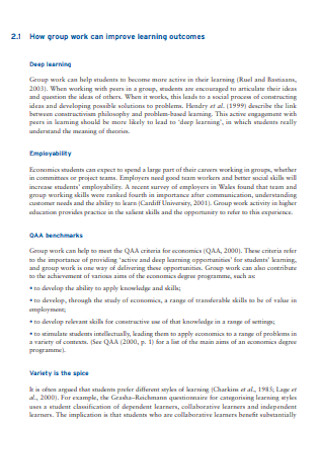
Groupwork and Assessment
download now -
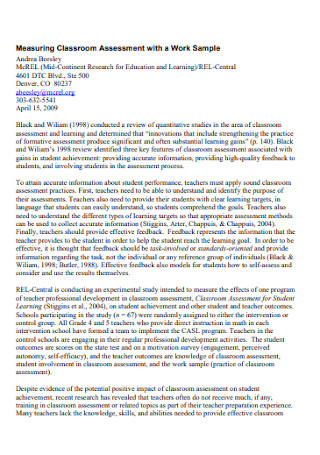
Classroom Work Assessment
download now -
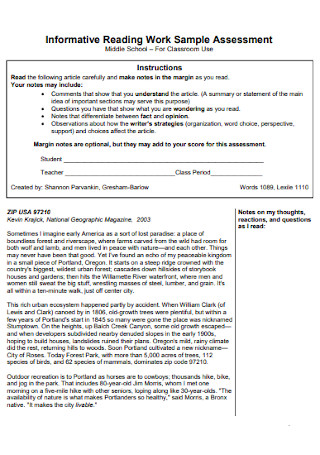
Informative Reading Work Assessment
download now -
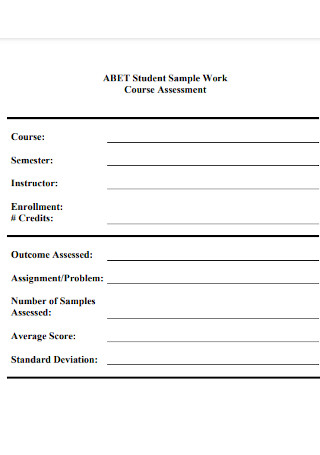
Student Work Course Assessment
download now -
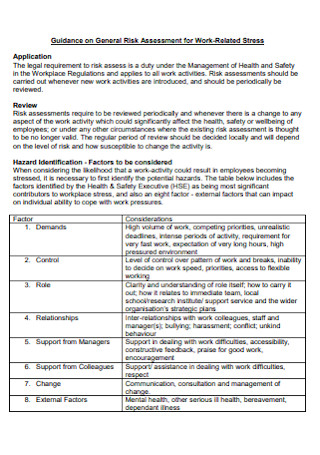
General Risk Assessment for Work
download now -
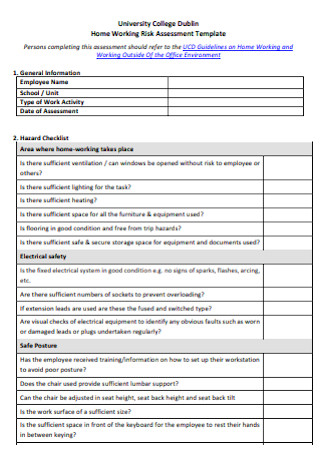
Home Working Risk Assessment Template
download now -
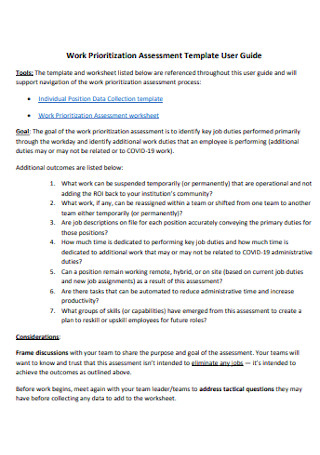
Work Prioritization Assessment Template
download now -
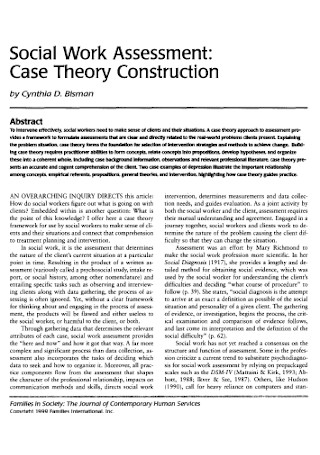
Social Work Assessment Template
download now -
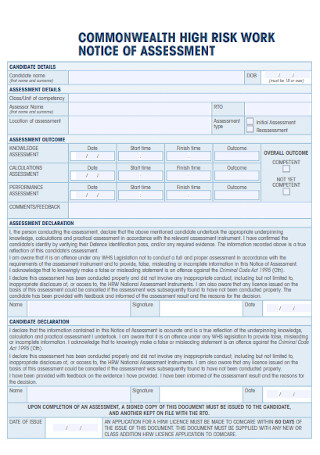
Work Notice of Assessment
download now -
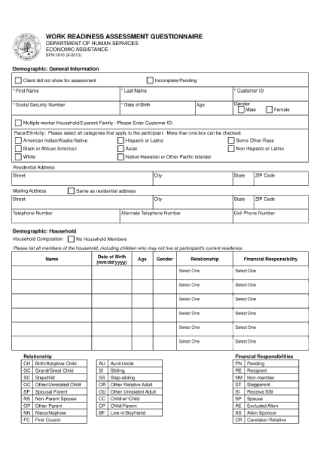
Work Assessment Questionnaire
download now -
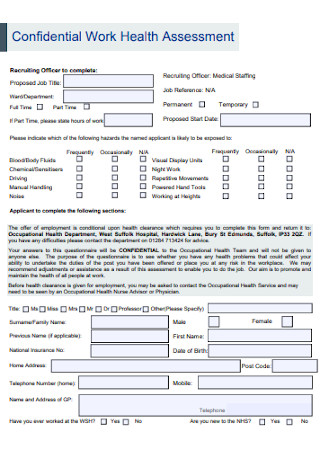
Work Health Assessment
download now -
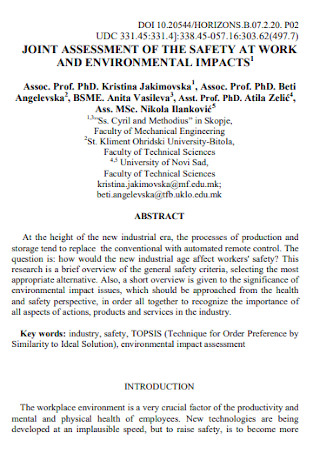
Joint Assessment of Safety Work
download now -
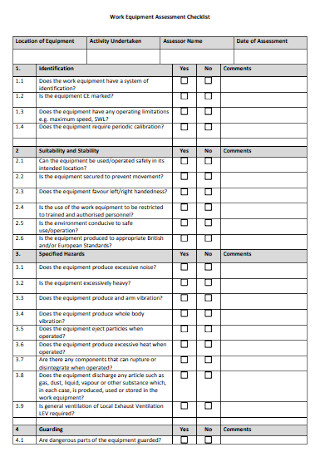
Work Equipment Assessment Checklist
download now -
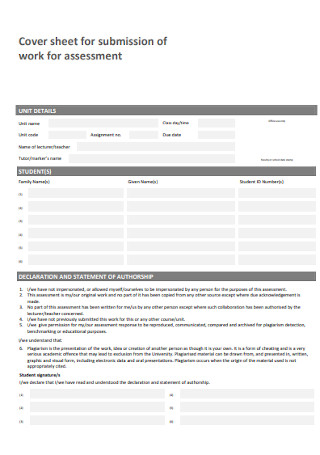
Work for Assessment Cover Sheet
download now -
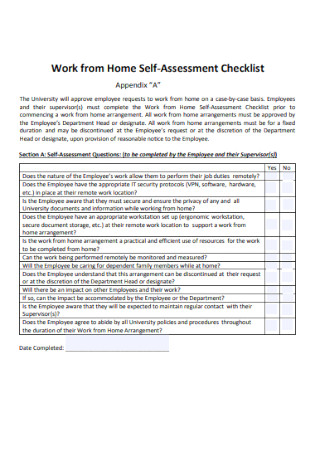
Work from Home Assessment Checklist
download now -
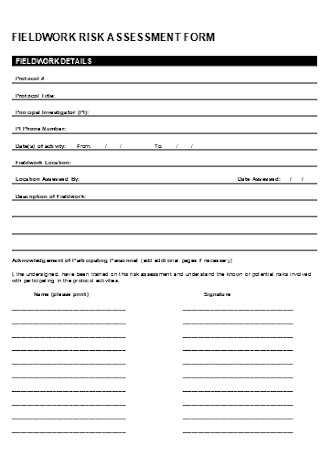
Field Work Risk Assessment
download now -
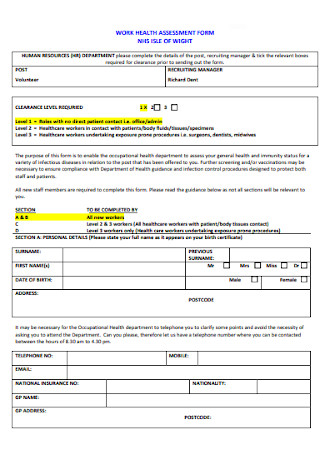
Health Work Assessment Form
download now -
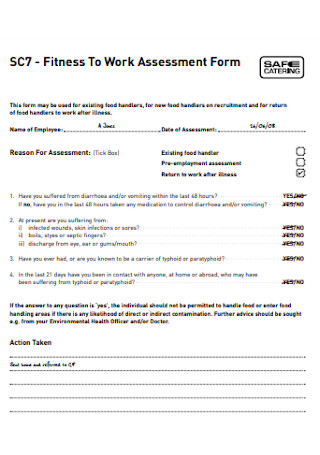
Fitness Work Assessment
download now -
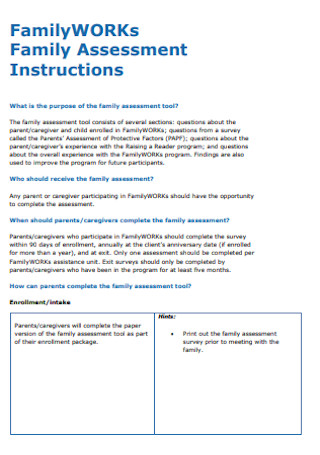
Family Work Assessment
download now
FREE Work Assessment s to Download
26+ Sample Work Assessments
What Is a Work Assessment?
Benefits of a Work Assessment
Assessment Components
How To Prepare for an Assessment
FAQs
What purpose does skill assessment serve?
Are you still eligible for employment if you fail an assessment test?
What is the primary purpose of assessment?
What Is a Work Assessment?
A work assessment is conducted to ascertain the nature of current workplace and employee problems. Essentially, you’re attempting to show all of the different factors that indicate whether employees are performing well or if there are specific reasons why they aren’t meeting expectations. This entails reviewing their primary job description to determine whether they are carrying out the assigned tasks and acceptable to the company. When it comes to office work, you’ll need to consider all of the employee’s strengths, weaknesses, areas of opportunity, and threats that could affect how they perform the job.
Thus, an assessment is one of the best ways to ensure that employees understand or are reminded of their objectives and how they should be accomplished. Keep in mind that the work assessment aims to improve by identifying and resolving previously unseen issues affecting the employee’s performance. According to government statistics, the proportion of first social work assessments that do not result in further action has reached its highest level in six years. According to the ‘characteristics of children in need’ figures, 27.8% of referrals that led to an assessment resulted in no further action, up 2.4 percentage points from the previous year.
Benefits of a Work Assessment
Remember that a work evaluation isn’t just for determining how well individuals perform in their jobs; it’s also for you to examine the working environment and decide what can improve it. Even you should see how such an essential examination can result in a plethora of advantages. Here’s an outline of what you can get out of a thorough work assessment:
Assessment Components
Depending on which components are required or what the client requires, the assessment can last from half a day to two days. The most often used components are described in detail below.
Aptitude Test
Aptitude tests are included in almost every sort of evaluation. This test evaluates your ability or aptitude for a specific task in a systematic manner. The various forms of aptitude tests available usually focus on a word, numerical, and visual connections. To measure the intelligence level or degree of thinking, the average of all these separate tests is used. A low score on this component may result in a rejection. However, this is dependent on the amount of thinking required by the job. It is suggested that you practice this ahead of time. This will help you become more accustomed to the questioning style and will allow you to focus on the questions.
Personality Test
Assessment Personality tests, for example, are typically administered via a questionnaire in which the candidate is presented with propositions. You must indicate your level of agreement or disagreement with the propositions. These tests usually contain between 30 and 300 questions, depending on the assessment type. This type of examination is not based on correct or incorrect responses. It is critical, therefore, that you remain truthful and accurate to yourself.
Role-Playing
When you participate in an assessment, you will typically be asked to perform a role. During this role play, practical simulation is used to assess your ability to deal with specific situations. Numerous scenarios are frequently acted out to paint a clear picture of you. The roles offered to you may be related to the position you are applying for or linked to potential future positions within the company. The following is an executive summary and explanation of the most frequently used role-plays.
Two-Way Interview
The two-way interview is the most frequently used role play in assessment. You will be evaluated on your oral communication skills and whether you are goal-oriented, motivated, and purposeful in your work during this interview.
Post and Letter Writing
This type of role-playing is occasionally referred to as an ‘inbox-test,’ as it simulates the handling of both internal and external mail. In practice, this frequently entails making judgments in response to various mail items that should ultimately benefit the organization. This allows for assessing various management skills, including independence, fact interpretation, decisiveness, prioritization, and administrative competence.
Fact-Finding
The purpose of this roleplay is to establish facts that must then be connected to produce advice. Frequently, this is accompanied by a problem in which critical information is missing. It is your responsibility to elicit the necessary information by asking the appropriate questions. This enables an evaluation of your working style.
How To Prepare for an Assessment
It is always beneficial to be prepared when having an assessment, regardless of your personality type. A thorough assessment preparation can alleviate nerves and allow you to perform at your best on the day of the assessment. The following are the five most critical points to remember as you prepare for an assessment.
Step 1: Make sure you’re well-rested.
The most vital preparation for an examination may be a good night’s sleep. Before the assessment, make sure you have a decent night’s sleep. Also, take your time getting dressed in the morning to don’t come rushed and tired.
Step 2: Practice
You may have heard that there’s no way to prepare for an evaluation report, but this isn’t true. You will know what to expect, your speed will improve, and you will know what to pay attention to if you practice the exams and assignments commonly utilized in an online assessment. Make sure you know what aptitude tests are and practice them, so you’re comfortable with them.
Step 3: Have faith in yourself.
Prepare thoroughly for the exam, but also have faith in your talents. When evaluating, nerves can be crippling, but you can put them away if you trust and believe in yourself. If you start the assessment thinking you’ll fail, you won’t make a confident first impression, and you’ll most likely fail.
Step 4: Maintain a presence that is not overwhelming.
Be yourself during the evaluation, but avoid exaggerating your authoritarian and present demeanor. Of course, your ability to lead and express yourself clearly will be evaluated, and do not forget to listen to and respond to what others have to say. A forced presence and persistence can create a mistaken impression.
Step 5: Do not underestimate it.
Confide in your abilities, but do not take them lightly. Prepare for the assessment by appearing well-prepared and groomed, and take all assignments seriously. If it is evident that you are making a half-hearted effort, no company will hire you.
FAQs
What purpose does skill assessment serve?
Employers frequently use skills assessment tests to evaluate the abilities and skills of current employees and job applicants. These tests determine whether an individual possesses the skills required to perform various and critical aspects of a job.
Are you still eligible for employment if you fail an assessment test?
Hiring managers must consider the results of failed pre-employment assessment tests, even more so if they believe these candidates are a good fit and should be considered further. While lowering cutoff scores is possible, this new standard must be applied to all applicants.
What is the primary purpose of assessment?
One of the main goals of evaluation is to inform. The findings of an assessment process should provide information that may be used to identify whether or not the faculty’s targeted learning outcomes have been met. The data analysis can then be utilized to figure out how to make programs better.
While conducting a work assessment is never easy, it is necessary to ensure that each employee can perform in the manner they are expected to and provide them with a positive and comfortable working environment. Therefore, if you’re conducting an assessment, be sure to follow all of the steps outlined above. If you’d like to study more about running a work assessment, you can also check our site for the other articles you need. Once you have those articles, what do you do with them? You can utilize all of the information contained within them to benefit you and your business.
